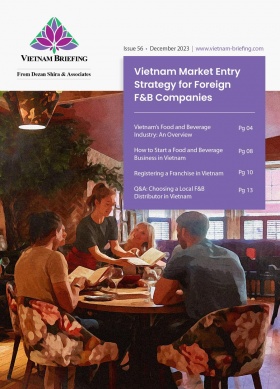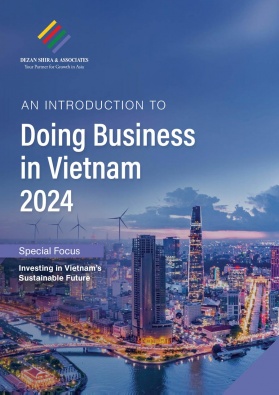How to Set Up a Representative Office in Vietnam
A Representative Office (RO) offers a low-cost entry for companies seeking to gain a better understanding of the Vietnam market. As such, this option is among the most common for first-time entrants to the Vietnamese market and often precedes a larger presence within the country.
A Representative Office (RO) is one of the most popular and common market entry options for foreign investors in Vietnam. An RO offers a low-cost entry option for businesses that want to get a feel of the Vietnamese market before making a commitment to a bigger investment in the country.
This article gives an overview of what is needed to set up an RO in Vietnam, including compliance, reporting, and tax implications.
The legal basis is Decree No. 07/2016/ND-CP, which refers to the implementation of the Trade Law on establishment, operation, rights and obligations of representative offices and branches of foreign businesses in Vietnam. It must not be confused with Decree No. 14/2024/ND-CP, which came into effect March 25, 2024, and regulates the RO establishment of domestic and foreign trade promotion organizations.
Decree 07/2016/ND-CP has a broader scope of application and reflects the business operations allowed in Vietnam under its WTO commitments.
What are ROs permitted to do?
Representative offices are dependent on their parent company and are not allowed to generate their own profits or enter directly into contracts. They are also not allowed to issue invoices.
ROs are permitted to engage in the following activities:
1. Conducting market research
2. Acting as a liaison office for its parent company
3. Promoting the activities of its head office through meetings, and other activities, that leads to business at later stages
What do you need to get a license?
Pre-licensing checklist for setting up a RO:
1. File an application for setting up a RO with company chop or seal
2. Appointment letter of Chief of RO with identification documents and company seal
3. Power of attorney in favor of consultant to submit the application dossier
4. Certificate of Incorporation for the Company and/or Business Registration Certificate of the Company
5. Audited financial report of the company for the latest fiscal year or Confirmation of tax obligations fulfillment
6. Passport of Chief of RO if foreigner or passport/ID card if Chief is Vietnamese
7. Memorandum of Understanding (MoU) of leasing office or leasing contract
8. Documents providing legal rights of landlord regarding the right of leasing office
For steps 4 to 5, the foreign entity would require one notarized and consularized copy of each document and a translated and notarized copy in Vietnamese by a Vietnamese notary. For steps 6 to 8, a notarized copy by a Vietnamese notary is required.
What do you need to do after you get the license?
Post-licensing checklist for setup a RO:
1. Make a seal for the RO:
>>License on the establishment of RO
>>Passport of Chief of RO if foreigner or passport/ID card if Chief is Vietnamese
2. Register a Tax code for RO:
>>Declaration to register a tax code
>>Power of attorney
>>Certificate of seal registration
>>Certificate of RO in Vietnam
3. Open a bank account of RO:
>>License on the establishment of RO
>>Certificate of seal registration
>>Certificate of tax code registration
>>Letter of authorization appointing the authorized signatories of the bank accounts
>>Other documents as required by the bank
4. Announcement of the establishment of RO of Company.
For steps 1 to 3, notarized documents will be required to complete the process.
How long does it take to set up an RO?
ROs can be set up in between six to eight weeks. We recommend hiring a professional service to deal with the myriad of laws and procedures.
Given the absence of in-country revenue and associated licensing requirements, the setup process for this option does not entail as many bureaucratic procedures as others.
An RO license is valid for five years but can be extended for another five years.
What comes next?
Hiring, tax, and reporting.
There is no cap on the number of local and expatriate employees that a representative office can hire as long as their employment is properly documented.
All expatriate hires including the chief representative are required to have a work permit. ROs can hire staff directly or use the assistance of recruiting agencies. However, there might be hidden restrictions on number of expatriates employed depending on the Work Permit issuing authority where ROs are headquartered.
An RO is not subject to Vietnamese corporate income tax (CIT). However, it is responsible for declaring its employees’ personal income tax (PIT).
In order to determine payable tax, ROs have to undertake a tax audit that checks all revenues and expenses during the tax term to establish grounds for declaring and paying tax.
The RO also has to send reports of its activities of the previous year to the Department of Industry and Trade before January 30 of each year. These reports are also known as the Annual Report.
The Annual Report must be in accordance with Circular No. 11/2016/TT-BCT. Among other details, the annual report must include the list of employees working for the RO and any change within the reporting year. In addition, the report must also include what the RO has done during the year such as its promotion activities and marketing events.
Businesses that fail to submit the annual report on time, risk fines of up to VND 40 million (US$1,573.56). It can also result in difficulties if the RO wants to amend or renew its license.
Tax implications: When a foreign entity becomes a Permanent Establishment
As discussed earlier, an RO is only permitted to do market research activities and act as a liaison office for its parent company. It cannot engage in commercial activities or support the parent company with its commercial activities in Vietnam.
A Permanent Establishment (PE) is defined as per local laws as well as the double tax avoidance (DTA) agreement between Vietnam and other countries. Generally, the PE definition under a DTA takes precedence over domestic regulations.
If a foreign business wants to convert the RO into a PE but has been carrying out activities as per local laws, it could activate a licensing risk. Therefore, foreign businesses should ensure that their RO performs activities as per the DTA guidelines. In addition, if the RO performs activities that are outside its scope, it may be subject to additional tax in Vietnam.
However, in case the foreign business wants to close the RO, it will go through a dissolution procedure. This does not automatically relate to establishing a new FDI company. These are two different procedures. Foreign investors should note that ROs and PEs (FDI company) are separate entities and governed by different authorities. The former is DIT (Department for International Trade Vietnam) and the latter is DPI (Department of Planning and Investment). Thus, they can exist at the same time without having to convert the RO into an FDI company.
To avoid any licensing or tax risks, businesses are advised to refrain from getting their ROs involved in buying and selling activities between two parties or any other activities generating revenue.
Foreign investors looking to establish a presence in Vietnam should use the services of registered local advisors who can ensure their set up process is accurate while complying with the relevant DTAs and local regulations.
(This article was originally published in January 2022. It was last updated July 9, 2024.)
(US$1 = VND 25,420).
About Us
Vietnam Briefing is published by Asia Briefing, a subsidiary of Dezan Shira & Associates. We produce material for foreign investors throughout Asia, including ASEAN, China, and India. For editorial matters, contact us here and for a complimentary subscription to our products, please click here. For assistance with investments into Vietnam, please contact us at vietnam@dezshira.com or visit us at www.dezshira.com.
Dezan Shira & Associates assists foreign investors throughout Asia from offices across the world, including in Hanoi, Ho Chi Minh City, and Da Nang. We also maintain offices or have alliance partners assisting foreign investors in China, Hong Kong SAR, Dubai (UAE), Indonesia, Singapore, Philippines, Malaysia, Thailand, Bangladesh, Italy, Germany, the United States, and Australia.
- Previous Article Understanding Vietnam’s Middle Class: Size, Spending Patterns, and Opportunities for Businesses
- Next Article Eco-Industrial Parks in Vietnam: Implementation and Key Goals








